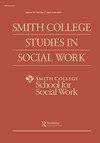性骚扰和性侵犯经历的性别差异以及对#metoo运动的态度
IF 0.9
Q2 SOCIAL WORK
引用次数: 0
摘要
摘要本研究的目的是调查性骚扰和性侵犯经历的性别差异,以及对性骚扰和#MeToo运动的态度。我们对364名女性和253名男性进行了横断面研究。尽管该研究显示,经历过性骚扰和性侵犯的女性和男性比例很高,但几乎所有检查结果都存在显著的性别差异:29%的女性报告经历过性侵犯,而男性为15%。在对性骚扰和#MeToo运动的态度上也发现了显著的性别差异,女性对这场运动的态度比男性更积极。逐步回归被发现是显著的,人口统计学变量、对性骚扰的态度和性骚扰的受害者预测了对#MeToo运动态度的大约46%的变化。报告遭受过性骚扰和性侵犯的妇女比例较高,这表明社会上必须继续对性骚扰进行预防干预,并加强对这一问题的认识。此外,干预措施和运动也应侧重于男性,他们也应被视为受害者。本文章由计算机程序翻译,如有差异,请以英文原文为准。
Gender Differences in the Experience of Sexual Harassment and Assault, and Attitudes toward the #metoo Campaign
ABSTRACT The goal of the current study was to examine gender differences in the experiences of sexual harassment and assaults, and attitudes toward sexual harassment and toward the #MeToo campaign. We conducted a cross-sectional study of 364 women and 253 men. Although the study revealed high percentages of women and men who experienced sexual harassment and assault victimization, significant gender differences were found in almost all outcomes examined: 29% of women reported having experienced sexual assaults compared to 15% of men. Significant gender differences were also found in attitudes toward sexual harassment and toward the #MeToo campaign, women being more positive toward the campaign than men. A stepwise regression was found to be significant, with demographic variables, attitudes toward sexual harassment, and being victims of sexual harassment predicting approximately 46% of the variance in attitudes toward the #MeToo campaign. The higher prevalence of women who reported having experienced sexual harassment and assaults demonstrates that prevention interventions against sexual harassment in society must continue, and awareness of the issue must be intensified. Additionally, interventions and campaigns should focus on men as well, who should also be recognized as victims.
求助全文
通过发布文献求助,成功后即可免费获取论文全文。
去求助
来源期刊

SMITH COLLEGE STUDIES IN SOCIAL WORK
SOCIAL WORK-
CiteScore
1.50
自引率
10.00%
发文量
10
期刊介绍:
Smith College Studies in Social Work focuses on the vital issues facing practitioners today, featuring only those articles that advance theoretical understanding of psychological and social functioning, present clinically relevant research findings, and promote excellence in clinical practice. This refereed journal addresses issues of mental health, therapeutic process, trauma and recovery, psychopathology, racial and cultural diversity, culturally responsive clinical practice, intersubjectivity, the influence of postmodern theory on clinical practice, community based practice, and clinical services for specific populations of psychologically and socially vulnerable clients.
 求助内容:
求助内容: 应助结果提醒方式:
应助结果提醒方式:


